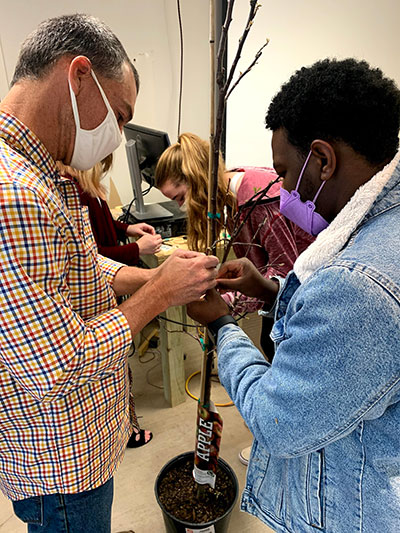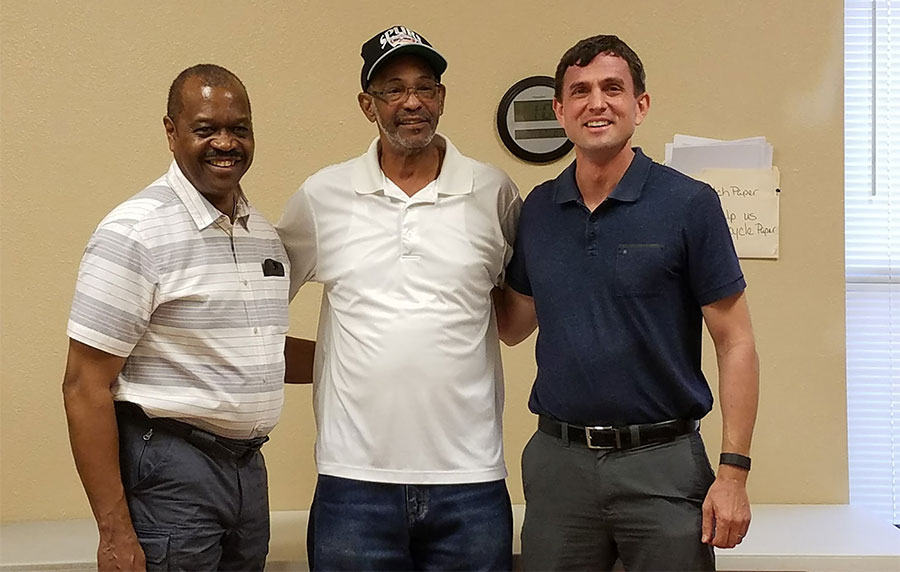Researcher Engages Community in Search for Lost Apple Varieties, Archival Projects & More
By: Kaitlyn Hale
Comparing apples to apples isn't as easy as it seems, especially when the varieties you're trying to compare have been lost.
Through a search for lost varieties of Texas apples, as well as several acts of community-engaged scholarship, Bryan Giemza, an associate professor of humanities and literature in the Honors College, is showing what can be accomplished when a community is engaged and participating in research.
While working on an oral history project, Giemza spoke to an expert on heirloom apple varieties, many of which went away in the 1920s and 1930s with the advent of refrigeration and supermarkets. The man mentioned that he was never able to canvas Texas for heirloom apples, so Giemza built a course around uncovering some of the state's lost varieties.
As students searched for forgotten Texas apples, they also began to engage with the community. Students explored farmers markets and interviewed grocery story produce managers. They created documentaries and chased down leads.

“Occasionally, as happens with research, they kind of hit the wall,” Giemza said. “When that happened over and over again, these community members would come forward and say, I'm going to give you a lead to somebody who knows about this.”
The hard work paid off, and students were able to bring one of those lost apple varieties back.
“It's not something that we're just going to appreciate in Texas Tech, this is something good in the world that's for the entire community,” Giemza said.
The class is a great example of the importance of actively including the community in research that may involve or affect them, and it's a common theme across all of Giemza's projects.
“For me, it's more than service,” Giemza said. “It's a way of generating knowledge and solving problems that changes the power dynamic between the community and an academic institution. And the main thing about it, in my way of thinking, is that it needs to be a really meaningful partnership.”
Giemza, who has authored or edited six books on American literary and cultural history, said he became interested in community-engaged scholarship early in his career. However, he wasn't sure how to bridge the gap between teaching about the humanities and using that expertise to meet a community's needs. In the end, that gap wasn't so large after all.
“I guess I realized that good researchers, they don't just use libraries, they make archives, and that's true of strong communities too,” Giemza said. “And because I'm a humanist, and my stock and trade is stories and narrative, I realized that's actually a really good way into these kinds of interactions.”

Giemza currently serves as on the Board of the San Antonio African American Community Archive & Museum (SAAACAM), which he helped to establish through an Andrew Mellon Foundation Grant. He said one of the first questions to answer when beginning the project was, “How do we make sure that universities honor [the community's vision], and that the history really remains in the hands of the community and is represented by the community?”
“Ultimately, it goes back to this idea that if you have and hold a history, that's the way to have dignity and meaning. That's especially important in communities that have felt excluded or silenced in American experience.”
Research that takes place on a university campus is generally in the hands of the primary researcher, even if members of the community or others outside the university participate. Giemza's approach gives preference to the community first.
“Instead of having researchers say, ‘Well, this is what I think the problem is,' the community, however large or small, is saying, ‘Here's where we would really like to get involved in research,'” Giemza said. “And they are involved in setting the terms, not only just defining themselves but defining how we make knowledge together. How do we do meaningful work that's going to be helpful to our community?”
Communities aren't always easily defined. Any group of like-minded individuals that shares an interest or history could be considered a community. There are many instances where a community's view of itself is different from the way researchers perceive it, Giemza said, which makes it important to give deference to the community and to understand that members of a community have different perspectives.
Any community-engaged scholarship project relies on listening to the community's needs and discovering new ways of engaging the community in that work.
“I've done community curation projects in which a community will bring forth an object that a scholar might say, well, I've seen that before or you know, that seems fairly ordinary,” Giemza said. “Then a story comes out about that thing and why it's valued, and the community ultimately does the curation and tells the story. It really changes the whole dynamic.”
The applications for community-engaged research go far beyond apples.
Giemza has launched a multidisciplinary initiative, Creating Livable Futures, led by students and supported by a broad coalition of faculty and community members. The project aims to engage the Texas Tech student community in developing a cleaner, healthier community on campus and furthering sustainability broadly across university communities.
For Creating Livable Futures, that includes finding ways to get high levels of participation for initiative-related activities like community signposting and electric alternatives for traveling, like electric bikes.
Additionally, Giemza is in the beginning stages of a community history project in Luboock, which will teach elementary students to interview community members and curate community history. As a public scholar for the Sowell Family Collection in Literature, Community and the Natural World, he is also working on a web interface that will make the collection available to all users.
“I want to do everything I can to lower barriers to access,” Giemza said.
Discoveries
-
Address
Texas Tech University, 2500 Broadway, Box 41075 Lubbock, TX 79409 -
Phone
806.742.3905 -
Email
vpr.communications@ttu.edu
